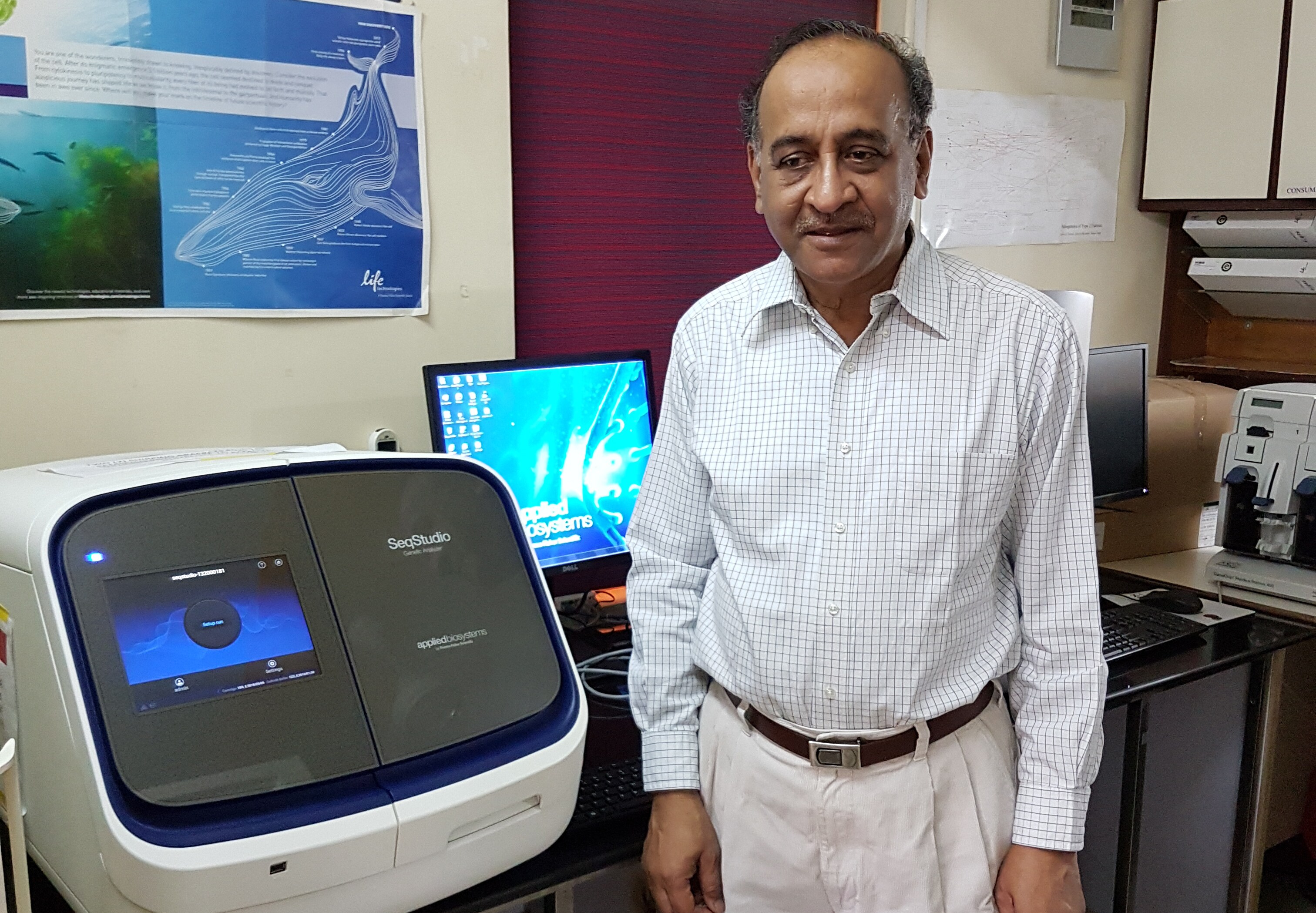 One of the features integral to the Applied Biosystems SeqStudio Genetic Analyzer has researchers at the Institute of Human Genetics (IHG) in Ahmedabad, Gujarat, India, excited for future studies into human inherited diseases. The compact bench-top molecular powerhouse comes complete with polymer-chilling functionality. This allows for a four-month on-instrument period, even when researchers face the possibility of extreme temperature changes in the lab. This feature makes it a boon for working in India’s variable climate. Winters in the state of Gujarat see temperature fluctuations between 12°C and 29°C, and summers experience maximums of 49°C even at night, with high humidity during the monsoon season.
One of the features integral to the Applied Biosystems SeqStudio Genetic Analyzer has researchers at the Institute of Human Genetics (IHG) in Ahmedabad, Gujarat, India, excited for future studies into human inherited diseases. The compact bench-top molecular powerhouse comes complete with polymer-chilling functionality. This allows for a four-month on-instrument period, even when researchers face the possibility of extreme temperature changes in the lab. This feature makes it a boon for working in India’s variable climate. Winters in the state of Gujarat see temperature fluctuations between 12°C and 29°C, and summers experience maximums of 49°C even at night, with high humidity during the monsoon season.
According to Dr. Jayesh Sheth, founding member and chairman of the Foundation for Research in Genetics and Endocrinology (FRIGE) at the IHG, the instrument brings not only in-house sequencing ability, but also stability despite environmental temperature fluctuations.
Sheth and his team are investigating inherited diseases that affect local and national populations. These include hemoglobinopathies, lysosomal storage diseases such as Gaucher disease and Tay-Sachs disease, and rare genomic causes of intellectual delay that may present with atypical phenotypes, such as Mowat-Wilson syndrome. The institute is recognized by the Government of India’s Ministry of Science and Technology as a Scientific and Industrial Research Organisation (SIRO). As such, the IHG is part of a national task force cataloging disease distribution across the country and identifying common molecular markers for diagnosis.
The research teams at FRIGE focus on mapping chromosomal anomalies and exome sequencing among other strategies for molecular marker discovery. To date, they have reported that Gaucher disease is the most common lysosomal storage disease in India, with the L444P mutation in the glucosylceramidase beta gene as the most common molecular marker in Type 1 patients. Their research data also reveal common molecular mutations for inherited disease among the Gujarati population, including the missense mutation E462V in the HEXA gene for Tay-Sachs disease, seen mainly in the Parmar community. Research into molecular markers associated with intellectual disability has uncovered a novel familial LIN1 missense mutation. Furthermore, FRIGE research into hemoglobinopathies identified the five most prevalent mutations in beta thalassemia cases in India, consisting of IVS 1-5(G>C), 619bp deletion, FS 8/9(+G), IVS 1-1(G>T), and cd 15(G>A), which are seen in nearly 70–80% patients with the disease.1
Until acquiring the Applied Biosystems SeqStudio Genetic Analyzer, Sheth and colleagues routinely sent out sequencing tasks to a collaborating partner institute, which would then return ABI 3130 Sanger sequencing base-called data for the researchers to analyze. Although FRIGE researchers still rely on partners for next-generation sequencing (NGS) needs, the arrival of the SeqStudio instrument brings Sanger sequencing and fragment analysis conveniently in-house. Instead of running a two-stage verification with external laboratories, the teams can now generate data on their own time lines and to their own specifications. Once NGS pinpoints the mutations of concern, Sheth and his team can investigate further using the Sanger sequencing capabilities of the SeqStudio.
The Applied Biosystems SeqStudio instrument first came to Sheth’s attention at a conference, through colleagues from a partner institution. Already interested in buying Sanger sequencing capability for his laboratory, Sheth chose the SeqStudio instrument for its compact, bench-top size, ease of use and straightforward maintenance. In addition to the built-in cooling functionality, SeqStudio fits perfectly into IHG labs, as it requires minimal training before operatives start reaping valuable and highly accurate results.
In addition to pleasing staff, the instrument has also made itself at home in terms of climate. With its unique integrated cooling functionality, which maintains polymer operating temperatures at a consistent level, Sheth notes that there is no need to keep the air conditioning running at maximum. The chiller takes care of the single polymer cartridge system, which manages both sequencing and fragment analysis tasks in a click.
The Applied Biosystems SeqStudio instrument also fits in well with FRIGE future plans; Sheth and the team are keen to explore the range of powerful applications available from the instrument. For example, they would like to explore fragment analysis to complement other molecular strategies in researching myotonic dystrophies. The researchers also plan to continue exploring its custom capabilities for probe and assay creation, which will add to the lab’s in-house molecular functionality.
Reference
1. Sheth, J.J., et al. (2008) “β-thalassemia mutations in western India,” Indian Journal of Pediatrics, 75(6) (pp. 567–70).
Leave a Reply